
Bussiness expressions for making negotiations.
- Subject:
- Business and Communication
- Material Type:
- Lesson
- Date Added:
- 12/14/2017

Bussiness expressions for making negotiations.

If you are an entrepreneur, one of your priorities, in addition to building your company, is ensuring you have enough money at the right times. Early Stage Capital will consider a broad range of questions that entrepreneurs deal with on this front, including the following: What should your strategy and your priorities be in raising early stage capital? What are the market norms and standards in structuring VC deals? What are the critical negotiating strategies and tactics? How will your company be valued? How can you obtain the optimal valuation for your new venture? What are the critical elements in the relationship between venture capitalists and entrepreneurs? How is the “venture model” evolving? Is it broken? What is the impact of Super Angels and micro VCs?
These are key questions that face all entrepreneurs in 2010, particularly first-time entrepreneurs. This course aims to prepare you for these decisions, as either a potential entrepreneur or venture capitalist. Using live interactions with leading figures in the venture finance community, most of the class sessions will analyze fundamental strategies of the venture-capital investment process and the critical importance of the relationship between entrepreneur and investor. As well, we will have a tactical focus on demystifying the legalities and jargon of the term sheet and the “A round” financing process. Significantly for 2010, we will also frequently consider the rapid and arguably fundamental change in VC today as the “lean startup” model threatens much of the traditional role and value of the venture investor.
Disclaimer: The websites for this course and the materials they offer are provided for educational use only. They are not a substitute for the advice of an attorney and no attorney-client relationship is created by using them. All materials are provided “as-is”, without any express or implied warranties.

DATA: Worldwide Wetlands Inventory. TOOL: Ramsar International Wetlands Data Gateway. SUMMARY: Learn about wetlands around the world. Perform a series of searches to identify wetland areas that need protection.
(Note: this resource was added to OER Commons as part of a batch upload of over 2,200 records. If you notice an issue with the quality of the metadata, please let us know by using the 'report' button and we will flag it for consideration.)
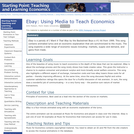
Ebay is a parody of I Want it That Way by the Backstreet Boys a #1 hit from 1999. This song contains animated lyrics and an economic explanation that are synchronized to the music. The song explores a wide range of economic issues including: markets, supply and demand, and gains from trade.

This lesson plan is geared for social studies, but can also be used in other content areas.
Media is a powerful agent in informing us and influencing social norms in our society. In this lesson plan, students learn about how to critically consume daily information and entertainment by listening to experts in media literacy. This lesson covers concepts like media ownership, framing and spin, source, agenda, bias, contextually misleading content and misinformation and disinformation.
Students also explore how media can affect livelihoods. They’ll study how Japanese American communities all along the west coast including in Washington state were impacted by media coverage leading into Japanese American incarceration in the 1940s and through redress and reparations in the early 1980s.

This resource is a one-hour e-learning module that can be incorporated into a Learning Management System using the SCORM interface and used as part of a course. Make sure the SCORM feature is available within the LMS at your institution. Download the zip file.Follow the instructions to upload a SCORM file to your LMS and course shell.
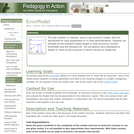
This site contains 21 modular, easy to use economic models, that are appropriate for class assignments or in-class demonstrations. Students can simulate all the standard models taught in most economics courses. EconModel uses the Windows OS. The simulations were developed by William R. Parke of the University of North Carolina at Chapel Hill.
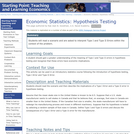
This activity helps a student recognize the consequences of Type I and Type II errors in hypothesis testing.

This lesson introduces students to the three main types of economic systems, command, market, and mixed. Students work with limited knowledge, not knowing about mixed systems until the very end. This allows students to see the pieces of command systems and market systems that are present in the United States and in their “ideal” economies.
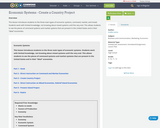
This lesson introduces students to the three main types of economic systems, command, market, and mixed. Students work with limited knowledge, not knowing about mixed systems until the very end. This allows students to see the pieces of command systems and market systems that are present in the United States and in their “ideal” economies.
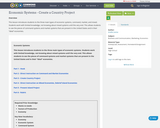
This lesson introduces students to the three main types of economic systems, command, market, and mixed. Students work with limited knowledge, not knowing about mixed systems until the very end. This allows students to see the pieces of command systems and market systems that are present in the United States and in their “ideal” economies.

This lesson was made for use in a business classroom to teach the concept of economic utility.

Designed for a large urban high school’s upperclassmen in a Journalism class, the unit’s central thematic focus is the causes and effects of economic inequality on the middle class. In this country, we believe that everyone has a chance for prosperity, or at least a comforting sense of security: being able to pay our bills, send our children to college, succeed if we try hard enough, being able to afford health care. Taken together, we call this being middle class. Put another way, we call this The American Dream. Some of us aspire to great wealth, a mansion in the Hamptons. For the vast majority of Americans, making it is a simpler aspiration: doing better than our parents, living longer than our parents, being more educated than our parents. My topic is “The Shrinking Middle Class?” Within this topic are various subtopics/questions: 1) What is an accurate definition of “Middle Class?” (Is it defined by an income range or by a state of mind?) 2) What are the effects of periodic economic downturns on ordinary Americans? (confidence, conformity, fear of failure, mental health), 3) What effects do increases in the minimum wage have on the middle class? (decreased poverty, overall confidence in the future, the effect on the overall economy?) My own students are urban and many do not consider themselves, and are not, among the middle class. The topic should resonate.
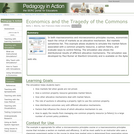
In both macroeconomics and microeconomics principles courses, economists teach the virtue of markets as an allocative mechanism. But markets sometimes fail. This example allows students to simulate the market failure associated with a common property resource, a salmon fishery, and evaluate ways to control fishing. The simulation also shows the distributional results of different allocative mechanisms. The simulation was developed by Paul Romer at Stanford University and is available on the Aplia web site.

America has evolved into an ownership society. Home-buying decisions, resource allocation, debt exposure, and financial planning for the future are now left to individuals, many of whom may lack the financial understanding to evaluate and make sound decisions. Economics, with its insistence on quantifying ideas and putting specific quantitative values on all manner of phenomena, can help sort through the questions. Economics for Life: Real-World Financial Literacy is designed to help soon-to-be college graduates start their "real lives" with a better understanding of how to analyze the financial decisions that they will soon have to make. Written in an easy-to-read, conversational style, this textbook will help students learn how to make decisions on saving and investing for retirement, buying a car, buying a home, as well as how to safely navigate the use of debit and credit cards.

Mini course introduction video: https://www.youtube.com/watch?v=-wx_SJ5yJYMPrerequist: Have academic English learningHave basic economic knowledgeLearning Purpose: help students improve expertise of economies of scale and economies of scopeLearning Objectives:Define what economies of scale and economies of scope areUnderstand similarities and differencesList advantages and disadvantagesKnow the importance of themAnalyze the influence of them

En este texto se habla brevemente sobre los tópicos y conceptos fundamentales del comercio internacional.

This lesson will allow students to select and share what details are important on a topic. Groups of students will research a topic and then discuss and determine the top 25 important things someone should know about the topic.

Cetățenia digitală este un termen umbrelă utilizat pentru a descrie o serie de subiecte legate de accesul digital, utilizarea responsabilă a tehnologiei, alfabetizarea digitală financiară, amprentele digitale și chiar bunăstarea fizică și psihologică. Este clar că cetățenia digitală se poate manifesta în mai multe feluri, fiind considerată și abordată variat/în alte moduri de către diferiți oameni. Ceea ce este însă important este recunoașterea faptului că, pentru a progresa în noua societate/economie digitală, avem nevoie de cunoștințe și competențe noi, bazate pe era digitală. Sperăm ca modulul propus vine în întâminarea tuturor formatorilor cu o abordare modernă, reușind să facă dintr-un proces de specializare tehnică o experiență dinamică, eficientă și relevantă, pentru formarea unor generații de cetățeni responsabili și activi.

No surprise—people with more education often earn higher incomes and are unemployed less than those with less education. Those with higher incomes also tend to accumulate more wealth. Why? Research shows that well-educated people tend to make financial decisions that help build wealth. Their strategies, though, can be used by anyone.